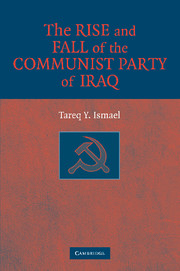Book contents
- Frontmatter
- Contents
- Preface
- 1 The Communist Party of Iraq: Origins and Foundations
- 2 Ascent of the ICP in Iraqi Politics
- 3 Party Rift: The Emergence of the Central Leadership
- 4 Alliance with the Baʿth
- 5 The Rebirth of the Central Leadership in the 1970s
- 6 Crisis: Disintegration or Renewal?
- 7 Conclusion: From Vanguard Activism to Rearguard Opportunism
- Index
6 - Crisis: Disintegration or Renewal?
Published online by Cambridge University Press: 24 November 2009
- Frontmatter
- Contents
- Preface
- 1 The Communist Party of Iraq: Origins and Foundations
- 2 Ascent of the ICP in Iraqi Politics
- 3 Party Rift: The Emergence of the Central Leadership
- 4 Alliance with the Baʿth
- 5 The Rebirth of the Central Leadership in the 1970s
- 6 Crisis: Disintegration or Renewal?
- 7 Conclusion: From Vanguard Activism to Rearguard Opportunism
- Index
Summary
When the Central Committee held its Fourth Party Congress in Ziwiah Ka on the Iraq-Iran border from 10 to 15 November 1985, it found itself divided once more over the direction and objectives of the Party. The split in the Central Committee into two distinct groups along ethnic lines had become evident by the plenum of June-July 1984, and crystallized at the 1985 Congress. The Kurds congregated around Secretary-GeneralʿAzîz Muḥammad, while the Arab groups gathered under the leadership of Bâqir Ibrâhîm al-MÛsawî, a member of the Politburo; ʿÂmir ʿAbd-ul-lah; Mahdî al-Ḥâfiẓ, Mahdî ʿAbd-ul-Karîm; NÛrî ʿAbd-ul-Razzâq; Mâjid ʿAbd-ul-Riḍâ; ʿAdnân ʿAbbâs; Muḥammad Ḥasan Mubârakj and ʿAbd-ul-Wahâb Ṭâhir. In addition to personal animosities between the two cliques, there was also a clear split between the leadership inside Iraq and that from outside that exacerbated their political differences.
The two objectives dividing the Party were whether its immediate priority should be the overthrow of the Baʿth or the defence of the country in the ongoing war with Iran. Zâkî Khairî led the faction calling for a concentration of Party activities against the possibility of an Iranian occupation of Iraq. The dispute resulted in the expulsion of many in the Arab faction and in a reduction in the size of the Central Committee from forty-four members, which had been elected by the Third Congress, to only twenty-four, as it was announced that twenty members of the dThird Congress Central Committee would not be running for re-election.
- Type
- Chapter
- Information
- The Rise and Fall of the Communist Party of Iraq , pp. 264 - 310Publisher: Cambridge University PressPrint publication year: 2007



